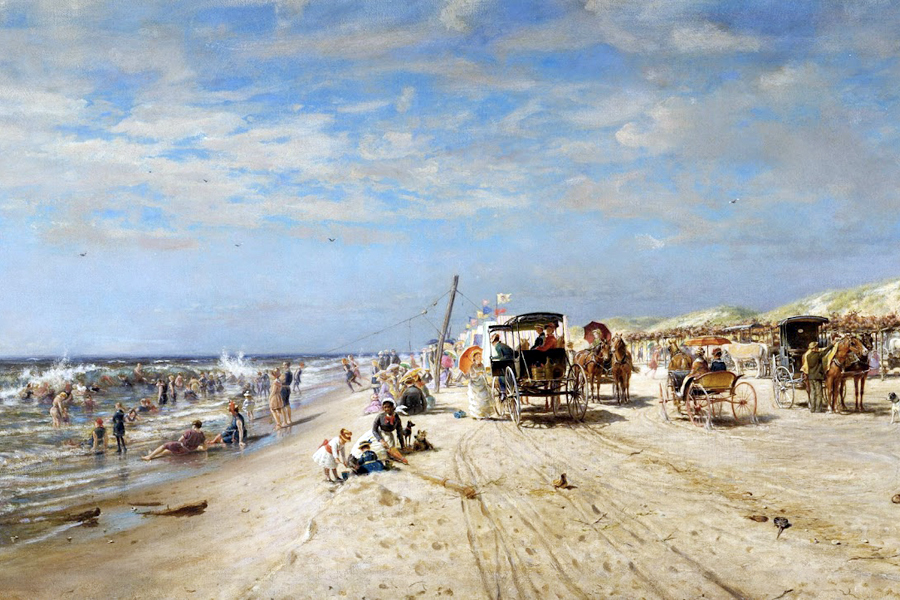300 Years of Southampton Trustees Decisions Could Be Overturned

The Trustees of the Freeholders and Commonalty of the Town of Southampton is an ancient and unique organization in that town, not connected up either with the Town or the State of New York. They have owned, on behalf of the townspeople, all the bay bottoms, beaches, dunes, wetlands, trails and certain roads for more than 300 years, and they make the laws on these properties and enforce them. Similar organizations exist in East Hampton and Southold.
They have a fascinating history. All three Towns were founded in the 1640s by English settlers. Governments were set up. Colonists elected “Trustees” to represent them. They have continued to this day, surviving the founding of the country in 1776, and even up through about 1910, when the State of New York created the Town Boards for all the towns in the state.
When that happened, the town boards moved into the town halls and took over much of what the Trustees did. They did not, however, supersede the Trustees of the Freeholders and Commonalty in doing their original duty defined by the King’s Patent. The Trustees, also with offices in the town building, continued to be in charge of the beaches, bay bottoms, wetlands and dunes as before. They have remained independent of the Town and State. They were created before the State. And what they were to own and supervise were the precious resources of the community. They would be responsible only to the people who elected them.
There have been frequent legal challenges to the Trustees’ existence since 1910, particularly by those wishing to develop the shoreline. All have failed. The most recent challenge was by the State of New York, itself, which in 2010 created a law that would require surfcasters to buy state fishing licenses. The Southampton Trustees challenged this. The State soon abandoned their law. There would be no saltwater fishing licenses. Those in these three eastern towns continue to surfcast for free.
The Trustees collect fees for dockage, for clamming licenses and for other things on their land. Recently they have been selling large amounts of sand that has accumulated on their property to oceanfront homeowners who need more sand for protection against winter storms. Last year, the Trustees banked about $1.3 million in selling this sand. The Trustees also benefit from annual monies allocated to it by the Town Board, which is put into a special account. The Trustees use it for, among other things, payment of legal fees to defend themselves and their charges from challenges.
All of this is of some significance right now because three weeks ago State Supreme Court judge Peter H. Mayer ruled, incredibly, that the Southampton Town Trustees, by receiving money from the Town with State approval, are beholden to the Town regarding how that money is spent. The judge writes “it is inconceivable that the state legislature would require that the town control where the Trustees deposited the funds they officially received, but would leave the guidelines as to the manner of accounting or the monitoring of the use of said funds to be agreed to by the parties to be accounted, that is the Trustees themselves…”
With this piece of logic, the judge proceeds to support the plaintiff’s claims that the Trustees are, or should be, a division of the town government; the plaintiffs had said that, therefore, all the monies the trustees have collected and spent for years, in the millions of dollars, should be considered an “unlawful” use of public funds. Cited in the decision are donations given to nonprofit organizations, money spent for flowers for funerals, money spent for ordinance enforcement, equipment, secretaries and clerks and even the bills charged by construction companies that let out the waters of Sagaponack Pond and Mecox Bay into the sea every six months or so, a job which has been done since the settlers first came.
As for the money from the sand sale, the fundraisers, the fees and everything else, it is all the town’s money, not the Trustees’ money, to oversee, the judge ruled. He orders the trustees to list all the bank accounts where they held this money from 2005 to the present so transactions can be examined, and he issues a preliminary injunction in the case that prevents further use of the funds in these accounts, citing a request in this legal action that “…the waste of public funds through the discernable desire of the Trustees to continue their unfettered expenditures, in their sole discretion, of public funds from the Trustee accounts and the enormity of the past expenditures is both immediate, likely to recur and irreparable.”
The Southampton Press has written about this decision. They say “the ruling even seems to indicate that some members of the Trustees, current and former, could be held personally liable for reimbursement of public funds spent on improper expenditures.” This reporter agrees with that statement.
The case was brought by some private citizens in the little Village of West Hampton Dunes, where for years the Trustees and the private citizens (one of whom is the mayor’s wife) have been embroiled in another case involving at least 2 acres of land that suddenly appeared where wetlands had been before in the bay in that village. The village approved a request from the private citizens group that these 2 acres, which abuts their land and sticks out into the bay, belongs to them. The Trustees have challenged that ruling, saying the land is technically part of Moriches Bay, an area under their purview.
“It happened in a sudden event,” the President of the Trustees, Eric Shultz, told me. “The ocean broke through the barrier island there, and it carried this sand onto our property to become land. Now the breach has been healed. In a sudden event, the property remains with who owned it before.” And that was the Trustees, he believes.
Shultz also said that this was nothing but an attempt by the plaintiffs to dry up the Trustees’ ability to pay the attorneys in the land matter.
Needless to say, the mayor was gleeful at this decision. In a telephone conversation, he asked me to have a look at it. I said I would. And so he then had it sent to me.
Mr. Shultz’s response? The charities supported were other environmental groups that help save wetlands. The funeral money was for flowers and condolence cards for well-loved people in town. Bidding for work done was in accordance with state bidding practices. And there is an annual oversight audit done by the State of New York. Incidentally, a Southampton Trustee makes $23,900 a year. A Southampton Town Board member makes $60,000 a year.
Where does this go? To appeal. The appeal, the Trustees hope, would put a stay on the injunction ordering the Trustees to cease using their bank accounts. And an appeal is generally not denied when it comes from a government authority.
The Trustees of Southampton, East Hampton and Southold met last Wednesday to discuss all this. There’s going to be a lot of legal fees, a lot of paperwork and approvals and other things as this drags on, and much of it will be paid for one way or another by you and me as taxpayers.
In my opinion, the Trustees, this ancient independent body, provide a tremendous service protecting our natural environment, and whatever taxpayer money has to be spent to overturn this poorly thought through decision is money well spent.
Since this was written, Judge Mayer has issued still another decision, involving a case in West Hampton Dunes. He declares that the Trustees have no rights to regulate anything in the Village of West Hampton Dunes and, by implication, in any village in the Town of Southampton. Their only rights, he says, are to protect the beach rights of the townspeople while they are in the village.
Would an appeals court confirm a decision that would upset and void out hundreds of thousands of decisions made by these long-established government trustees? We’ll have to see.



